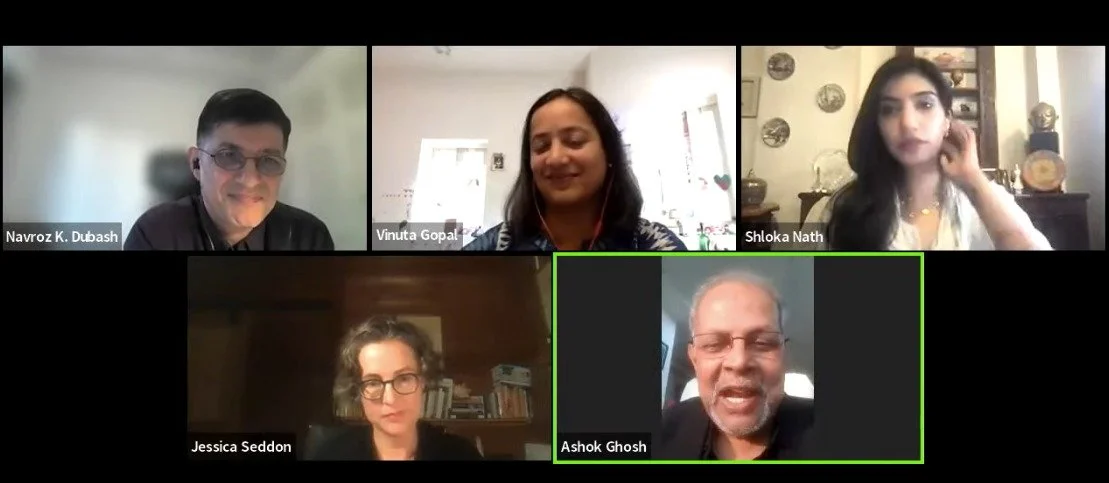The Summit, while recognizing key limitations of the current financial system, was thin on tangible outcomes, and points towards incremental progress rather than a systemic transformation.
Read MoreThis is a ‘stay-the-course’ budget on green growth, with the possible exception of support for hydrogen, but not, as yet, a green transformation inducing budget.
Read MoreIndian Environmental Law: Key Concepts and Principles, edited by CPR’s Shibani Ghosh, provides a critical analysis of the evolution of the environmental legal framework in India.
Read MoreA summary of CPR’s new research on the key institutional issues faced by pollution control boards in the Indo-Gangetic Plain, and panel discussion and media articles on the issue.
Read MoreAs India takes over the G20 presidency this year, it can work with other G20 countries to propel the LiFE movement forward.
Read MoreThe updated pledge reveals insights into India’s approach: one of caution and a preference to ensure over-compliance rather than under-compliance of international targets.
Read MoreBesides pointing to a climate conservative judicial role, this judgment is a grim reminder of the fact that the efficacy of climate action is determined by far more than the climate ambition of the Executive, but remains contingent on the interplay of different organs of the State.
Read MoreBanking of energy is a short-term alternative to promote renewable energy generation. While the Electricity (Promoting Renewable Energy Through Green Energy Open Access) Rules, 2022 recognise the importance of energy banking, they fail to provide a coherent framework for it.
Read MoreETS is gaining traction as a market-based instrument to reduce industrial emissions. However, questions around transparency, reproducibility, state capacity, and policy design and clarity threaten the viability of this approach in the Indian context.
Read MoreIndia is among the most vulnerable countries to climate change. Public communication, scientific expertise and stronger legislation will be the key factors in India’s adaptation efforts.
Read MoreThe current crisis can be explained by a demand surge, supply disruptions and dysfunctional cash flow. A strategic approach to the energy transition that harnesses the low-cost power promise of renewable energy and opportunities for diversification in energy mix is critical to address persisting power shortages.
Read MoreA new report report has shown us, yet again, that air pollution is a national emergency, and that we must reject the discourse centred solely around Delhi. We must eschew the techno-fixes currently dominating discourse and recognise the long-term transitions necessary to sustainably improve air quality.
Read MoreThe IPCC Working Group II’s synthesis of research on climate impacts, adaptation measures and vulnerability pushes governments and societies to respond immediately. The longer we wait on reducing global emissions, it argues, the fewer adaptation options we will have left.
Read MoreIn this piece, we unpack the Union Budget 2022, focusing on its implications for the current air quality regulatory framework and whether it gives impetus to new and ongoing interventions through adequate financial support. We find that the budget does little to improve air quality management in India.
Read MoreThe Union Budget of 2022-23 promises to take issues of sustainability and climate change seriously. And indeed, its framing on these issues is promising and forward looking. A look below the hood of the budget, however, presents, in practice, a far more mixed picture.
Read MoreThe OM if implemented by the MOEFCC would not only have adverse consequences on the effective functioning of the SEIAAs as environmental regulatory bodies but also on the life and livelihood of people and the surrounding ecology.
Read MoreIndia's nationwide, year-round air quality crisis requires a radical rethink. But how does parliamentary discourse frame this issue? How should India approach its air quality standards in light of the WHO making its global guidelines more stringent? What would "taking the long view" on air pollution strategy look like?
Read MoreAir pollution is a complex societal problem. We must recognise this and focus our attention on long-term policy pathways with clear goals and timelines
Read MoreWhile EVs can help improve local air quality, simply replacing existing vehicles with EVs will not be sufficient. EVs could not only lead to increased emissions upstream, but potentially also worsen non-exhaust emissions.
Read MoreMany have hailed this as an ambitious and determined commitment from India. How different are these targets from India’s existing energy targets? What are the implications of meeting these targets?
Read More



















